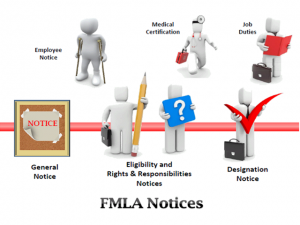In 2009, the U.S. Department of Labor required employers to provide the Family Medical Leave Act (FMLA) notice to employees regarding their eligibility and rights, as under the FMLA. Now the Courts are beginning to enforce this too.
Employer Fails to Provide FMLA Notice To Employee, So Judgment Entered in Favor of the Employee.
In a decision from the Federal District Court in New Jersey, in the matter of Young v. Wackenhut Corporation, the Court entered an automatic judgment in favor of the employee, when Wackenhut Corporation, failed to provide the FMLA notice to employee Jacqueline Young. Wackenhut met its general FMLA notice obligations in that it included in its employee handbook a notice to employees of their FMLA rights and also posted the DOL’s FMLA poster. However, when Young sought and took FMLA leave, she took all 12 weeks without having received from Wackenhut a Notice of Eligibility and Rights & Responsibilities and a Designation Notice.
Young took and exhausted her 12 weeks of FMLA leave, and when she failed to return to work, after the end of the 12 weeks, Wackenhut terminated her employment. When Young filed an FMLA interference claim and later filed a motion for summary judgment, the court ruled in favor of Young, no jury trial was needed! Automatic judgment was entered in favor of the plaintiff.
Why?
The Court held that, per the FMLA regulations, the individual FMLA notices provided to the employee are absolute, and when they are not provided, the employee is prejudiced:
Plaintiff was not afforded the opportunity to make informed decisions about her leave, based on the lack of FMLA notice provided to her by [Wackenhut]. Had she been appropriately apprised of her leave time, Plaintiff could have planned and structured her leave time differently. Thus, Plaintiff did suffer prejudice.
According to the court “individual notice” must be provided to the employee when he/she requests FMLA-related leave or when the employer acquires knowledge that an employee’s leave may be for an FMLA qualifying reason. 29 CFR 825.300(b). When the employer fails to do so, the employer may be strictly liable.
Insights for Employers & Employees
When employers do not provide the appropriate individual notices (i.e., the Notice of Eligibility and Rights & Responsibilities and the Designation Notice), it is tantamount to strict liability: and the employer can be liable for any loss that the employee suffers. As the court pointed out here, when an employee puts the employer on notice of the possible need for FMLA leave, the employer must provide the following notices or risk liability.
1. Eligibility Notice. Once an employee notifies an employer of an FMLA qualifying medical leave, including the birth of a child or care of a parent or spouse, “the employer must notify the employee of the employee’s eligibility to take FMLA leave within 5 business days” of ascertaining that her leave may be for an FMLA-qualifying reason, absent extenuating circumstances. 29 C.F.R. 825.300(b)(l).
Right and Responsibilities Notice. Whenever the Eligibility Notice (above) is provided, “Employers shall provide written notice detailing the specific expectations and obligations of the employee and explaining any consequences of a failure to meet these obligations. . . Employers are also expected to responsively answer questions from employees concerning their rights and responsibilities under the FMLA.” 29 C.F.R. 825.300(c)(1).
The Notice can be accessed here. (Notice of Eligibility and Rights & Responsibilities)
2. Designation Notice. Within 5 days of when an employer has enough information to determine whether the employee’s leave is FMLA qualifying, the employer must notify the employee in writing as to whether the leave will be designated and will be counted as FMLA leave. 29 C.F.R. 825.300(d)(1)(4).
Employers & Employees can access this Notice here. (Designation Notice)
As an employer you must be vigilant in providing these notices; and if you are an employee and were eligible for FMLA leave, and was not provided with the Notice of Eligibility and Rights & Responsibilities, kindly contact our office to discuss your legal options,





